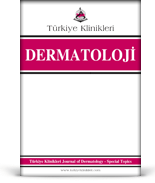Objective: Urticaria is a heterogeneous disease with multiple causative factors. A thorough literature research has revealed a very limited amount of evidence about the effects of smoking and alcohol consumption habits on the clinical characteristics of urticaria. The aim of the present study was to investigate the smoking and alcohol consumption habits of patients with urticaria and to evaluate the associations of these habits with clinical characteristics of urticaria. Material and Methods: A total of 171 consecutive patients with urticaria and age and sex-matched healthy controls were prospectively enrolled in the study. A detailed history regarding the smoking and alcohol consumption habits, duration of urticaria, hospitalization and treatment modalities for urticaria and clinical response to treatments was recorded. Detailed statistical analyses were performed. Results: Smoking frequency was significantly higher in patients than in controls. Patients, who were smokers had a 5.03-fold increased risk of urticaria. The frequency of hospitalization was higher in the smokers compared to the non-smokers. Smoking increased hospitalization risk 2.2-fold. In 39.6% of the non-smokers and 52.5% of the smokers, urticarial symptom control could not be achieved with low-dose oral antihistamines. Smoking increased the risk of urticaria 1.94-fold in low-dose antihistamine responders, while 3.27-fold in low-dose antihistamine non-responders. There wasn't any statistical correlation between alcohol consumption habits and outcome of urticaria. Conclusion: Our results strongly suggest that smoking affects the clinical course of urticaria. Smoking should be questioned in every patient with urticaria, since promoting cessation of smoking might be effective in the management of urticaria.
Keywords: Urticaria; smoking; alcohol consumption
Amaç: Ürtiker, birçok nedeni olan heterojen bir hastalıktır. Detaylı literatür araştırmaları, sigara ve alkol tüketiminin, ürtikerin klinik özelliklerine olan etkisini irdeleyen kısıtlı sayıda veriyi ortaya koymaktadır. Bu çalışmanın amacı, ürtiker tanılı olguların sigara ve alkol tüketim alışkanlıkları ve bu alışkanlıkların, ürtikerin klinik özellikleri üzerine etkilerini araştırmaktır. Gereç ve Yöntemler: Ürtiker tanısı olan 171 hasta ile yaş ve cinsiyet açısından eşleştirilmiş sağlıklı kontrol grubu prospektif olarak çalışma kapsamında değerlendirildi. Hastalardan sigara ve alkol tüketim alışkanlıkları, ürtiker süresi, hastaneye yatış durumu ve tedavi modalitelerini sorgulayan ayrıntılı hikâye alındı. Detaylı istatistiksel analizler yapıldı. Bulgular: Sigara tüketim sıklığı, kontrol grubuna göre hasta grubunda daha yüksekti. Hastalar arasında sigara içenlerde ürtiker 5,03 kat daha yüksek oranda tespit edildi. Hastaneye yatış oranları, sigara içen grupta içmeyenlere göre daha sıktı. Sigara tüketimi, hastaneye yatış sıklığını 2,2 kat artırıyordu. Sigara içmeyen grubun %39,6'sında ve sigara içen grubun %52,5'inde ürtiker semptomları, düşük doz oral antihistaminik tedavisi ile kontrol altına alınamıyordu. Sigara tüketimi, ürtiker riskini düşük doz antihistaminik tedavisine yanıt verenlerde 1,94; yanıt vermeyenlerse ise 3,27 kat artırıyordu. Alkol tüketimi ile ürtikerin klinik seyri arasında herhangi bir istatistiksel korelasyon saptanmadı. Sonuç: Çalışmamızın sonuçları, sigara tüketiminin ürtikerin klinik seyrini etkilediğini ortaya koymuştur. Sigaranın bırakılmasının, ürtikerin yönetiminde etkili olması nedeniyle sigara tüketim alışkanlıkları ürtiker tanılı her hastada sorgulanmalıdır.
Anahtar Kelimeler: Ürtiker; sigara tüketimi; alkol tüketimi
- Kanani A, Betschel SD, Warrington R. Urticaria and angioedema. Allergy Asthma Clin Immunol. 2018;14(Suppl 2):59. [Crossref] [PubMed] [PMC]
- Jain S. Pathogenesis of chronic urticaria: an overview. Dermatol Res Pract. 2014;2014:674709. [Crossref] [PubMed] [PMC]
- Givi ME, Blokhuis BR, Da Silva CA, Adcock I, Garssen J, Folkerts G, et al. Cigarette smoke suppresses the surface expression of c-kit and FcεRI on mast cells. Mediators Inflamm. 2013;2013:813091. [Crossref] [PubMed] [PMC]
- Barua RS, Sharma M, Dileepan KN. Cigarette smoke amplifies inflammatory response and atherosclerosis progression through activation of the H1R-TLR2/4-COX2 axis. Front Immunol. 2015;6:572. [Crossref] [PubMed] [PMC]
- Lapi F, Cassano N, Pegoraro V, Cataldo N, Heiman F, Cricelli I, et al. Epidemiology of chronic spontaneous urticaria: results from a nationwide, population-based study in Italy. Br J Dermatol. 2016;174(5):996-1004. [Crossref] [PubMed]
- Asero R, Tedeschi A, Marzano AV, Cugno M. Chronic urticaria: a focus on pathogenesis. F1000Res. 2017;6:1095. [Crossref] [PubMed] [PMC]
- Puxeddu I, Pratesi F, Ribatti D, Migliorini P. Mediators of inflammation and angiogenesis in chronic spontaneous urticaria: are they potential biomarkers of the disease? Mediators Inflamm. 2017;2017:4123694. [Crossref] [PubMed] [PMC]
- Tedeschi A, Kolkhir P, Asero R, Pogorelov D, Olisova O, Kochergin N, et al. Chronic urticaria and coagulation: pathophysiological and clinical aspects. Allergy. 2014;69(6):683-91. [Crossref] [PubMed]
- Krystel-Whittemore M, Dileepan KN, Wood JG. Mast cell: a multi-functional master cell. Front Immunol. 2016;6:620. [Crossref] [PubMed] [PMC]
- Wei XM, Kim HS, Kumar RK, Heywood GJ, Hunt JE, McNeil HP, et al. Effects of cigarette smoke on degranulation and NO production by mast cells and epithelial cells. Respir Res. 2005;6(1):108. [Crossref] [PubMed] [PMC]
- Mishra NC, Rir-sima-ah J, Boyd RT, Singh SP, Gundavarapu S, Langley RJ, et al. Nicotine inhibits Fc epsilon RI-induced cysteinyl leukotrienes and cytokine production without affecting mast cell degranulation through alpha 7/alpha 9/alpha 10-nicotinic receptors. J Immunol. 2010;185(1):588-96. [Crossref] [PubMed] [PMC]
- Bakke P, Gulsvik A, Eide GE. Hay fever, eczema and urticaria in southwest Norway. Lifetime prevalences and association with sex, age, smoking habits, occupational airborne exposures and respiratory symptoms. Allergy. 1990;45(7):515-22. [Crossref] [PubMed]
- Hennino A, Bérard F, Guillot I, Saad N, Rozières A, Nicolas JF. Pathophysiology of urticaria. Clin Rev Allergy Immunol. 2006;30(1):3-11. [Crossref] [PubMed]







.: Process List